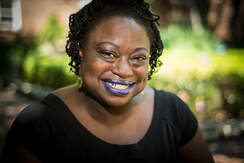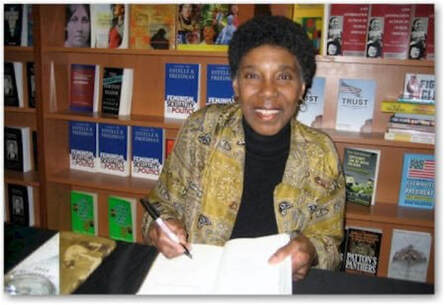 Rosamond S. King Rosamond S. King Somewhere, sometime, in every work of fiction written by Paule Marshall, a black woman laughs. But the laughter is not always the same; there are multitudes of knowledge, skill, and feeling in her different types of laughter. There is laughter that derides others, of self-loathing, of survival, and of freedom. Each novella in Marshall’s book Soul Clap Hands and Sing has a male protagonist. And yet each piece still manages to be about black women and how their appearance alters the way men feel about themselves. In “Brooklyn,” a white male professor consistently refers to the only black woman in his literature class as “girl” in his fantasies. At first, she is intimidated by him, and frightened when he solicits her, but later she approaches him to affirm her own sense of self – and “her sudden laugh [was] an infinitely cruel sound in the warm night.” This black woman’s laughter is mean and doesn’t fully endear us to her, but Marshall makes it clear that it took many years and a great deal of loneliness and pain for her to earn that laugh. Some of the laughter in The Chosen Place, the Timeless People – a novel which showcases Marshall’s talent for writing about visceral emotion – is also painful. Merle, a black Caribbean woman, is deeply haunted by her past, and she holds her ex-lover, a white Englishwoman, responsible for much of her misery. Yet Merle manages to empathize with the white wife of a man she has an affair with, until the woman tries to pay Merle to leave. The bribe is so close to how that other white woman treated her that after the offer, Merle’s “head went back and the earsplitting laugh erupted once again. And this time it was more a laugh and less the anguished scream that had sought to rid her of the dead weight. She might have been delivered.” Merle’s own laughter delivers her; she finds within herself the route from pain and guilt towards freedom and self-acceptance. In Marshall’s fiction, black women’s laughter is hardly ever at something funny. Instead, it’s a response to the absurdity of life, and especially of racism and poverty. It’s what in some places we call laugh for not to cry. The novella Reena describes this kind of laughter. As the title character and an old friend mourn being aging black women who are both alone and lonely, “again our laughter – that loud, searing burst which we used to cauterize our hurt mounted into the unaccepting silence of the room.” Not all of the laughter in Marshall’s work is painful. Despite her mother’s warnings, Selina, protagonist of Marshall’s first and probably most-taught novel, Brown Girl, Brownstones, seeks out Suggie – a single, “loose” woman – for information and advice about sex. Suggie happily complies, and at the end of the chapter (in what some describe as a homoerotic scene), "Together, laughing, their arms circling each other’s waists, they crossed the room and opened the door. A wide bar of light from the hall made a path for them, and the rich colors of their laughter painted the darkness.” In an essay published in Women’s Studies Quarterly that appears later in different form as “From the Poets in the Kitchen,” Marshall praises the working-class black, Caribbean women who talked around the kitchen table when she was a child. Crediting these women as her first literary inspiration, Marshall focuses on their intelligence and their creativity with language – not on the many isms that threatened them at every turn. According to Marshall, these black women’s “laughter which often swept the kitchen was, at its deepest level, an affirmation of their own worth; it said they could not be. defeated by demeaning jobs...” Black women’s laughter, on the page and in life is often loud and unabashed: what some might call vulgar or uncouth; what some of us call home. Take a moment and listen…if you’re a black woman, if you know black women intimately, then you can hear the shades of these different laughters percolating now. But if you don’t know black women, or if you want a reminder, look to the pages of Paule Marshall for black women’s laughter.
0 Comments
Your comment will be posted after it is approved.
Leave a Reply. |
Archives
October 2021
Categories |
Proudly powered by Weebly


 RSS Feed
RSS Feed